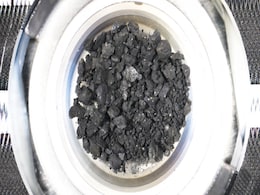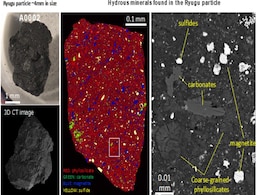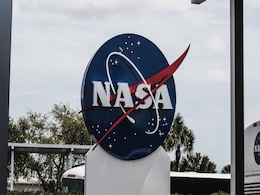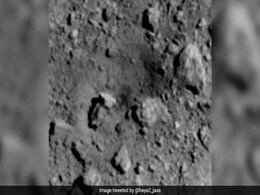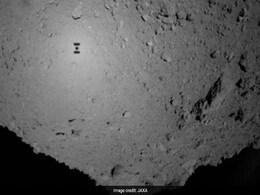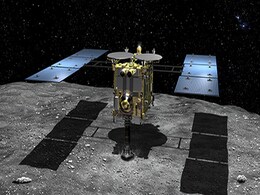Japanese Asteroid
- All
- News
-

Asteroid Discovery Suggests Ingredients for Life on Earth Came From Space
- Thursday March 23, 2023
- Reuters
Two organic compounds essential for living organisms have been found in samples retrieved from the asteroid Ryugu, buttressing the notion that some ingredients crucial for the advent of life arrived on Earth aboard rocks from space billions of years ago. Scientists said on Tuesday they detected uracil and niacin in rocks obtained by the Japanese Sp...
-
 www.gadgets360.com
www.gadgets360.com
-

How 3 Specks Of Dust Collected In 2005 Reveal An Asteroid's Secrets
- Tuesday January 24, 2023
- Science | Agence France-Presse
It took the Japanese spacecraft Hayabusa five years to return them to Earth, along with hundreds of other particles from Itokawa, and scientists have been analysing them for clues ever since.
-
 www.ndtv.com
www.ndtv.com
-

Asteroids May Have Brought Water To Earth Billions Of Years Ago: Study
- Tuesday August 16, 2022
- Science | Agence France-Presse
Water may have been brought to Earth by asteroids from the outer edges of the solar system, scientists said after analysing rare samples collected on a six-year Japanese space mission.
-
 www.ndtv.com
www.ndtv.com
-

Asteroids From Outer Edges of Solar System May Have Brought Water to Earth, Suggests New Study
- Tuesday August 16, 2022
- Agence France-Presse
Asteroids from the outer edges of the solar system may have brought water to Earth, claim scientists after analysing rare samples collected on a six-year Japanese space mission Hayabusa-2. The researchers are scrutinising material brought back to earth in 2020 from the asteroid Ryugu.
-
 www.gadgets360.com
www.gadgets360.com
-

Ryugu Samples Are Most Contaminant-Free Outer Solar System Particles, Says Study
- Tuesday August 16, 2022
- Edited by Gadgets 360 Newsdesk
In an in-depth analysis conducted by a team of Japanese researchers at JAMSTEC (Japan Agency for Marine-Earth Science and Technology), it is found that the Ryugu samples brought on Earth in December 2020 by the Japanese aircraft Hayabusa-2 are the most “uncontaminated” samples. This will help scientists get a crystal-clear insight into the chem...
-
 www.gadgets360.com
www.gadgets360.com
-

6-Year Space Mission's Surprising Conclusion About Water On Earth
- Tuesday August 16, 2022
- Science | Agence France-Presse
Water may have been brought to Earth by asteroids from the outer edges of the solar system, scientists said after analysing rare samples collected on a six-year Japanese space mission.
-
 www.ndtv.com
www.ndtv.com
-

NASA’s DART Asteroid Mission Could Severely Deform Target Asteroid, New Study Reveals
- Monday July 4, 2022
- ANI
NASA's DART mission could completely deform the target asteroid upon impact, according to a new study. Based on direct evidence from space missions like the Japanese space agency's Hayabusa2 probe that shows an asteroid can have a very loose internal structure, researchers have performed new simulations on the ambitious mission to collide with an a...
-
 www.gadgets360.com
www.gadgets360.com
-

Asteroid Dust Collected By Japan Space Mission Arrives On Earth
- Sunday December 6, 2020
- World News | Agence France-Presse
In a streak of light across the night sky, samples collected from a distant asteroid arrived on Earth on Sunday after being dropped off by Japanese space probe Hayabusa-2.
-
 www.ndtv.com
www.ndtv.com
-

Japan Creates First Artificial Crater On Asteroid
- Thursday April 25, 2019
- Science | Agence France-Presse
Japanese scientists have succeeded in creating what they called the first-ever artificial crater on an asteroid, a step towards shedding light on how the solar system evolved, the country's space agency said Thursday.
-
 www.ndtv.com
www.ndtv.com
-

Japan Space Agency's Probe Sends Impactor To Blast Asteroid
- Friday April 5, 2019
- Science | Agence France-Presse
A Japanese probe on Friday launched an explosive device at an asteroid, aiming to blast a crater in the surface and scoop up material that could shed light on how the solar system evolved.
-
 www.ndtv.com
www.ndtv.com
-

Japanese Space Probe Touches Down On Asteroid To Collect Samples
- Friday February 22, 2019
- Science | Reuters
A Japanese space probe named after a falcon, Hayabusa 2, has touched down on an asteroid more than 300 million kmfrom Earth on a mission to seek clues about the origins of life, Japan's space agency said on Friday.
-
 www.ndtv.com
www.ndtv.com
-

Japan's Hayabusa2 Probe To Land On Asteroid On February 22
- Wednesday February 6, 2019
- Science | Agence France-Presse
A Japanese probe Hayabusa2 sent to examine an asteroid in order to shed light on the origins of the solar system is expected to land on the rock later this month, officials said
-
 www.ndtv.com
www.ndtv.com
-

Japan Space Probe Launches New Robot Onto Asteroid
- Wednesday October 3, 2018
- Agence France-Presse
Japan's Hayabusa2 probe launched the French-German Mobile Asteroid Surface Scout, or MASCOT, towards the Ryugu asteroid's surface on Wednesday.
-
 www.gadgets360.com
www.gadgets360.com
-

Japan Space Probe Launches New Robot Towards Asteroid
- Wednesday October 3, 2018
- Science | Agence France-Presse
A Japanese probe launched a new observation robot towards an asteroid on Wednesday as it pursues a mission to shed light on the origins of the solar system.
-
 www.ndtv.com
www.ndtv.com
-

Asteroid Discovery Suggests Ingredients for Life on Earth Came From Space
- Thursday March 23, 2023
- Reuters
Two organic compounds essential for living organisms have been found in samples retrieved from the asteroid Ryugu, buttressing the notion that some ingredients crucial for the advent of life arrived on Earth aboard rocks from space billions of years ago. Scientists said on Tuesday they detected uracil and niacin in rocks obtained by the Japanese Sp...
-
 www.gadgets360.com
www.gadgets360.com
-

How 3 Specks Of Dust Collected In 2005 Reveal An Asteroid's Secrets
- Tuesday January 24, 2023
- Science | Agence France-Presse
It took the Japanese spacecraft Hayabusa five years to return them to Earth, along with hundreds of other particles from Itokawa, and scientists have been analysing them for clues ever since.
-
 www.ndtv.com
www.ndtv.com
-

Asteroids May Have Brought Water To Earth Billions Of Years Ago: Study
- Tuesday August 16, 2022
- Science | Agence France-Presse
Water may have been brought to Earth by asteroids from the outer edges of the solar system, scientists said after analysing rare samples collected on a six-year Japanese space mission.
-
 www.ndtv.com
www.ndtv.com
-

Asteroids From Outer Edges of Solar System May Have Brought Water to Earth, Suggests New Study
- Tuesday August 16, 2022
- Agence France-Presse
Asteroids from the outer edges of the solar system may have brought water to Earth, claim scientists after analysing rare samples collected on a six-year Japanese space mission Hayabusa-2. The researchers are scrutinising material brought back to earth in 2020 from the asteroid Ryugu.
-
 www.gadgets360.com
www.gadgets360.com
-

Ryugu Samples Are Most Contaminant-Free Outer Solar System Particles, Says Study
- Tuesday August 16, 2022
- Edited by Gadgets 360 Newsdesk
In an in-depth analysis conducted by a team of Japanese researchers at JAMSTEC (Japan Agency for Marine-Earth Science and Technology), it is found that the Ryugu samples brought on Earth in December 2020 by the Japanese aircraft Hayabusa-2 are the most “uncontaminated” samples. This will help scientists get a crystal-clear insight into the chem...
-
 www.gadgets360.com
www.gadgets360.com
-

6-Year Space Mission's Surprising Conclusion About Water On Earth
- Tuesday August 16, 2022
- Science | Agence France-Presse
Water may have been brought to Earth by asteroids from the outer edges of the solar system, scientists said after analysing rare samples collected on a six-year Japanese space mission.
-
 www.ndtv.com
www.ndtv.com
-

NASA’s DART Asteroid Mission Could Severely Deform Target Asteroid, New Study Reveals
- Monday July 4, 2022
- ANI
NASA's DART mission could completely deform the target asteroid upon impact, according to a new study. Based on direct evidence from space missions like the Japanese space agency's Hayabusa2 probe that shows an asteroid can have a very loose internal structure, researchers have performed new simulations on the ambitious mission to collide with an a...
-
 www.gadgets360.com
www.gadgets360.com
-

Asteroid Dust Collected By Japan Space Mission Arrives On Earth
- Sunday December 6, 2020
- World News | Agence France-Presse
In a streak of light across the night sky, samples collected from a distant asteroid arrived on Earth on Sunday after being dropped off by Japanese space probe Hayabusa-2.
-
 www.ndtv.com
www.ndtv.com
-

Japan Creates First Artificial Crater On Asteroid
- Thursday April 25, 2019
- Science | Agence France-Presse
Japanese scientists have succeeded in creating what they called the first-ever artificial crater on an asteroid, a step towards shedding light on how the solar system evolved, the country's space agency said Thursday.
-
 www.ndtv.com
www.ndtv.com
-

Japan Space Agency's Probe Sends Impactor To Blast Asteroid
- Friday April 5, 2019
- Science | Agence France-Presse
A Japanese probe on Friday launched an explosive device at an asteroid, aiming to blast a crater in the surface and scoop up material that could shed light on how the solar system evolved.
-
 www.ndtv.com
www.ndtv.com
-

Japanese Space Probe Touches Down On Asteroid To Collect Samples
- Friday February 22, 2019
- Science | Reuters
A Japanese space probe named after a falcon, Hayabusa 2, has touched down on an asteroid more than 300 million kmfrom Earth on a mission to seek clues about the origins of life, Japan's space agency said on Friday.
-
 www.ndtv.com
www.ndtv.com
-

Japan's Hayabusa2 Probe To Land On Asteroid On February 22
- Wednesday February 6, 2019
- Science | Agence France-Presse
A Japanese probe Hayabusa2 sent to examine an asteroid in order to shed light on the origins of the solar system is expected to land on the rock later this month, officials said
-
 www.ndtv.com
www.ndtv.com
-

Japan Space Probe Launches New Robot Onto Asteroid
- Wednesday October 3, 2018
- Agence France-Presse
Japan's Hayabusa2 probe launched the French-German Mobile Asteroid Surface Scout, or MASCOT, towards the Ryugu asteroid's surface on Wednesday.
-
 www.gadgets360.com
www.gadgets360.com
-

Japan Space Probe Launches New Robot Towards Asteroid
- Wednesday October 3, 2018
- Science | Agence France-Presse
A Japanese probe launched a new observation robot towards an asteroid on Wednesday as it pursues a mission to shed light on the origins of the solar system.
-
 www.ndtv.com
www.ndtv.com

